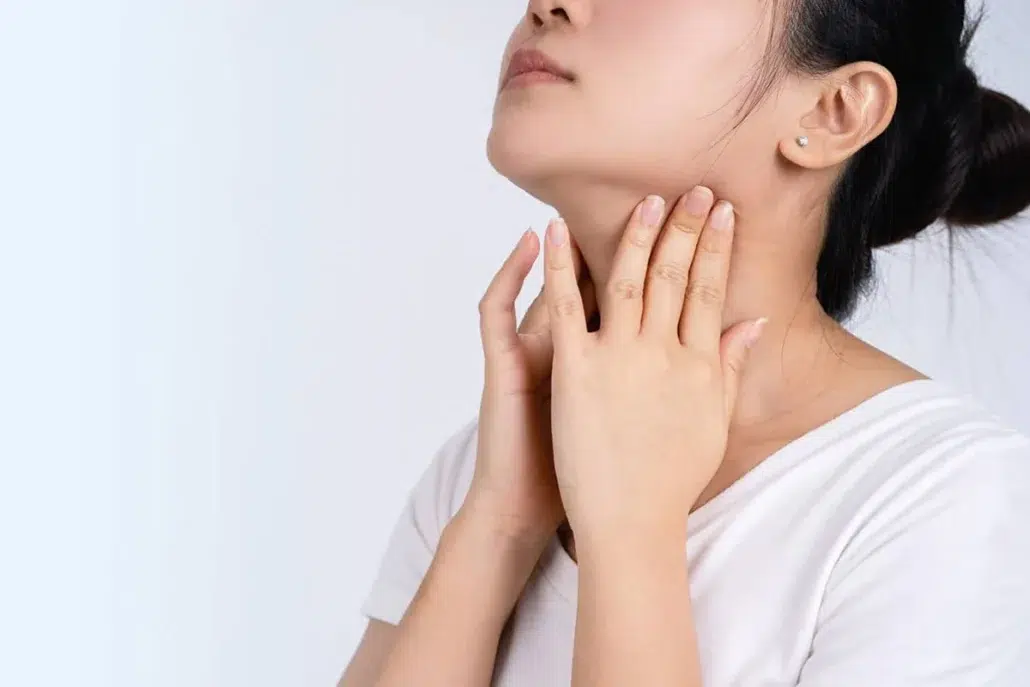A thyroid nodule is a lump that forms in the thyroid gland, which sits at the front of your neck. Most nodules are not serious, but some may need more testing to rule out conditions like cancer or problems with thyroid hormone levels. The right medical team can help you manage your condition and improve your quality of life.
Penn Medicine Becker ENT & Allergy offers reliable care and clear guidance for people with thyroid nodules, working closely with specialists—from endocrinologists to surgeons—to support every step of your care.

According to the American Thyroid Association (ATA), up to 50% of people develop thyroid nodules by age 60, and over 90% are benign.
What is a Thyroid Nodule?
A thyroid nodule is a lump or growth—either solid or fluid-filled—within the thyroid gland, located in the front of the neck, just below your Adam’s apple. These nodules are very common, occurring in up to two-thirds of Americans over their lifetime, particularly in women and older adults. Most thyroid nodules are noncancerous. They may appear as a single (solitary) nodule or as multiple nodules within an enlarged thyroid, a condition known as multinodular goiter. While both types often turn out to be benign, solitary nodules are sometimes evaluated more closely, as they may carry a slightly higher risk of being cancerous compared to multiple nodules.
Who to See for a Thyroid Nodule: Endocrinologist vs. ENT
The answer depends on the type of nodules you have and the symptoms you are experiencing. If your nodules are causing symptoms such as difficulty swallowing, hoarseness, or breathing problems, then it is best to see an ENT (ear, nose, and throat) specialist. If your nodules are not causing any symptoms, but you would like to be monitored for changes in size or shape, then an endocrinologist may be a better option. Ultimately, your doctor will help you determine which specialist is best suited to your individual needs.
Are Thyroid Nodules a Risk? Possibility of Cancer and Other Concerns
If you’ve been diagnosed with a thyroid nodule, you’re not alone. These lumps are fairly common and often harmless. They form in the thyroid gland in your neck, which controls important functions like energy and metabolism. Some nodules are so small they’re only found during imaging tests, while others can be felt or seen as a lump.
Even if your thyroid nodule turns out to be noncancerous (benign), your doctor may recommend keeping an eye on it over time—just to make sure nothing changes.

Are All Thyroid Nodules Dangerous?
No, most thyroid nodules are not dangerous. In fact, about 90–95% of them are benign and don’t lead to serious health problems. Many people have thyroid nodules without even knowing it, and most don’t need treatment right away.
However, some nodules may affect how your thyroid works, or in rare cases, may be cancerous. That’s why proper testing and follow-up care are important.
What Increases the Risk of Thyroid Cancer?
While thyroid cancer is relatively rare, a few factors may raise your risk:
- A family history of thyroid cancer
- A history of radiation exposure to the neck
- Nodules that feel hard or grow quickly
- Being under 20 or over 60 years old
- Hoarseness, trouble swallowing, or other voice changes
If your doctor notices any of these signs, they’ll likely recommend more testing to be safe.
Tests to Check for Cancer or Hormone Issues
To find out if a thyroid nodule is a risk, your doctor may recommend:
- Thyroid ultrasound to check the size, shape, and features of the nodule
- Fine needle biopsy to collect a small tissue sample for lab testing
- Blood tests to see if the nodule is affecting your hormone levels
These tests help determine whether the nodule is benign, cancerous, or causing thyroid hormone imbalances.
What Type of Doctor Treats Thyroid Nodules?
Thyroid nodules are often treated by a team of specialists. Endocrinologists manage hormone-related issues, surgeons handle biopsies or removal if needed, and radiologists and pathologists assist with imaging and lab analysis. ENT doctors may also be involved if the nodule affects your voice, swallowing, or breathing.
At Penn Medicine Becker ENT & Allergy, all of these experts work together to provide complete, coordinated care—so you get the support you need at every step.
Endocrinologists: Your First Line of Defense
An endocrinologist is a medical doctor who specializes in diagnosing and treating conditions related to the endocrine system, which includes the thyroid gland. Endocrinologists are experts in understanding how hormones affect the body and can help diagnose and treat nodules. They can also provide guidance on lifestyle changes that may help manage symptoms associated with this condition, such as fatigue or weight gain.
They can order tests to determine if the nodules are cancerous or benign and recommend treatment options such as medication or surgery.
If your endocrinologist determines that a nodule is cancerous or growing rapidly, surgery is sometimes required to remove it. An endocrinologist can examine thyroid cells and look for genetic changes. These changes could indicate a higher likelihood of head and neck cancer in the future.
Surgeons: When Surgery is Necessary
If a nodule is found to be cancerous, or if it is causing symptoms such as difficulty swallowing or breathing, then surgery may be necessary. Surgeons can remove the entire thyroid gland (thyroidectomy) or just part of it (lobectomy). They can also perform minimally invasive procedures such as radiofrequency ablation and cryotherapy to shrink the size of the nodules.
When considering surgery for these nodules, it is important to understand the risks associated with the procedure. Your doctor may recommend a physical examination to evaluate your overall health and determine if you are a good candidate for surgery.
Radiologists: Imaging and Diagnosis
Radiologists use imaging techniques such as ultrasound, CT scans, and MRI to evaluate the size, shape, and location of the nodules. This information can help determine if the nodule is cancerous or benign. Radiologists can also provide guidance on which type of surgery may be necessary to remove the nodule.
Imaging and diagnosis using thyroid scan and thyroid function tests:
Pathologists: Examining Tissue Samples
Pathologists specialize in examining tissue samples to diagnose diseases. In the case of thyroid nodules, pathologists can examine tissue samples to determine if the nodule is cancerous or benign. This is an important step in determining the best course of treatment for a patient with thyroid cancer. Pathologists use a variety of techniques to examine tissue samples, including microscopy and immunohistochemistry. They can also provide guidance on which type of surgery may be necessary to remove the nodule.
Techniques used by pathologists to examine tissue samples
Dietitians and Nutritionists: Eating for thyroid health
Working with a nutritionist or dietitian can help ensure that you are eating for optimal thyroid health. A healthy, balanced diet can help support optimal thyroid health and reduce symptoms associated with thyroid disease. Foods rich in iodine, selenium, zinc, and omega-3 fatty acids are especially beneficial for those with thyroid disorders. Additionally, avoiding processed foods and limiting caffeine intake can help reduce inflammation associated with thyroid disease. For those taking thyroid medication, it is important to take it at the same time each day and not eat or drink anything for 30 minutes after taking it.
Building a Personalized Treatment of Thyroid Nodules
Managing a thyroid nodule starts with understanding your body and getting the right team by your side. Many patients experience thyroid changes due to iodine deficiency or chronic inflammation, both of which can lead to abnormal growths. Addressing these underlying issues is key to avoiding complications.
A personalized care plan should include regular monitoring of your thyroid hormone levels, nutritional guidance, and lifestyle strategies to reduce stress and support overall health. Simple changes — like adjusting your diet, managing anxiety, and staying consistent with follow-up appointments — can make a big difference in your long-term thyroid health. Following the best diet for thyroid nodules, which may include iodine-rich foods, selenium, and anti-inflammatory options, can also support healthy thyroid function and help you feel your best.
At Penn Medicine Becker ENT & Allergy, with convenient locations across New Jersey and Pennsylvania, our team is here to help you take the guesswork out of managing your thyroid nodule. Whether you need evaluation, imaging, treatment, or ongoing care, our specialists work together to create a plan tailored just for you. Schedule a consultation with our expert team today.

